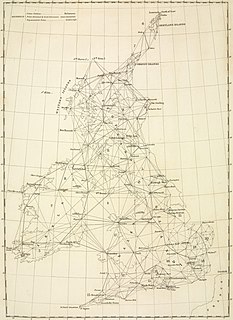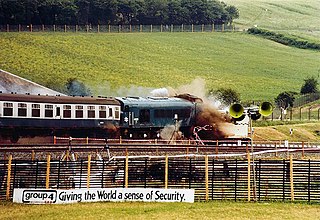William Dalby may refer to:
- William Dalby (politician) (1839–1916), mayor of Victoria, British Columbia
- William Dalby (engineer) (1862–1936), British engineer
- William Bartlett Dalby (1840–1918), British aural surgeon and otologist
William Dalby may refer to:

Dalby is a rural town and locality in the Western Downs Region, Queensland, Australia. In the 2016 census, the locality of Dalby had a population of 12,719 people.
Dalby may refer to:

Shrivenham is a village and civil parish in the Vale of White Horse, Oxfordshire, about 5 miles (8 km) southwest of Faringdon. The village is close to the county boundary with Wiltshire and about 7 miles (11 km) east-northeast of Swindon. The 2011 Census recorded the parish population as 2,347. Shrivenham is located within the historic boundaries of Berkshire. The 1974 boundary changes transferred the Vale of White Horse to Oxfordshire for the purposes of administration.

The Railway Series is a set of British children's books about a railway system located on the fictional Island of Sodor. There are 42 books in the series, the first published in 1945. Twenty-six were written by the Rev. Wilbert Awdry, the final one in 1972. Sixteen more were written by his son, Christopher Awdry, between 1983 and 2011.

The Principal Triangulation of Britain was the first high-precision triangulation survey of the whole of Great Britain, carried out between 1791 and 1853 under the auspices of the Board of Ordnance. The aim of the survey was to establish precise geographical coordinates of almost 300 significant landmarks which could be used as the fixed points of local topographic surveys from which maps could be drawn. In addition there was a purely scientific aim in providing precise data for geodetic calculations such as the determination of the length of meridian arcs and the figure of the Earth. Such a survey had been proposed by William Roy (1726–1790) on his completion of the Anglo-French Survey but it was only after his death that the Board of Ordnance initiated the trigonometric survey, motivated by military considerations in a time of a threatened French invasion. Most of the work was carried out under the direction of Isaac Dalby, William Mudge and Thomas Frederick Colby, but the final synthesis and report (1858) was the work of Alexander Ross Clarke. The survey stood the test of time for a century, until the Retriangulation of Great Britain between 1935 and 1962.

The British Rail Research Division was established in 1964 directly under the control of the British Railways Board, moving into purpose-built premises at the Railway Technical Centre in Derby. The intention was to improve railway reliability and efficiency, while reducing costs and improving revenue. In so doing it became recognised as a centre of excellence and, in time, was providing consultancy to other railways around the world. While it became famous for the Advanced Passenger Train (APT), its activities extended into every area of railway operation. The theoretical rigor of its approach to railway engineering superseded the ad hoc methods that had prevailed previously.
William Bartlett may refer to:

Burton Joyce railway station serves the village of Burton Joyce in Nottinghamshire, England. It lies between Carlton and Lowdham stations on the Nottingham to Lincoln Line.
William Adams may refer to:

The Ipcress File is a 1965 British espionage film directed by Sidney J. Furie and starring Michael Caine. The screenplay, by Bill Canaway and James Doran, was based on Len Deighton's novel The IPCRESS File (1962). It received a BAFTA award for the Best British film released in 1965. In 1999, it was included at number 59 on the BFI list of the 100 best British films of the 20th century.
William Beckett may refer to:
William or Bill Fawcett or variation, may refer to:
The Old Dalby Test Track is a railway in the United Kingdom which is used for testing new designs of trains. It runs between Melton Mowbray, Leicestershire and Edwalton, on the course of the Midland Railway's route between Kettering and Nottingham which closed to passengers on 1 May 1967 and to goods in 1968. It is 13.5 miles (21.7 km) in length.

Old Dalby railway station served Old Dalby in the English county of Leicestershire. It was opened on the Midland Railway Melton direct route between London and Nottingham, avoiding Leicester. The line still exists today as the Old Dalby Test Track.
William Dalby was a merchant, real estate and insurance agent and political figure in British Columbia, Canada. He was mayor of Victoria, British Columbia from April 15, 1873 when he was selected to replace mayor James D. Robinson to 1875.

Bowenville is a rural town and locality in the Toowoomba Region, Queensland, Australia. The town's economy rested on the rail industry and with the winding down of the railways the population declined. In the 2016 census, the locality of Bowenville had a population of 250 people.
William Ernest Dalby, FRS was a British engineer.

Dunnose is a cape on the Isle of Wight in the English Channel. The headland is visible from well out to sea, and is used in navigation. It has twice been used as the base point for a triangulation of Great Britain. The line of accurately surveyed points running north from Dunnose to Clifton in Yorkshire provide the basis for triangulation to determine the positions of all other locations in Britain.
Dalby is a Scandinavian place name meaning "valley settlement", during the Viking Age, the name was brought to England and it later also became an English surname. It can be a locational surname for those from Dalby, Lincolnshire, near Spilsby; in Dalby, Leicestershire near Melton Mowbray, and in Dalby, North Yorkshire, near Terrington. Notable people with the surname include:
Daldy is a British surname, now more common in Australia and New Zealand. It may refer to: